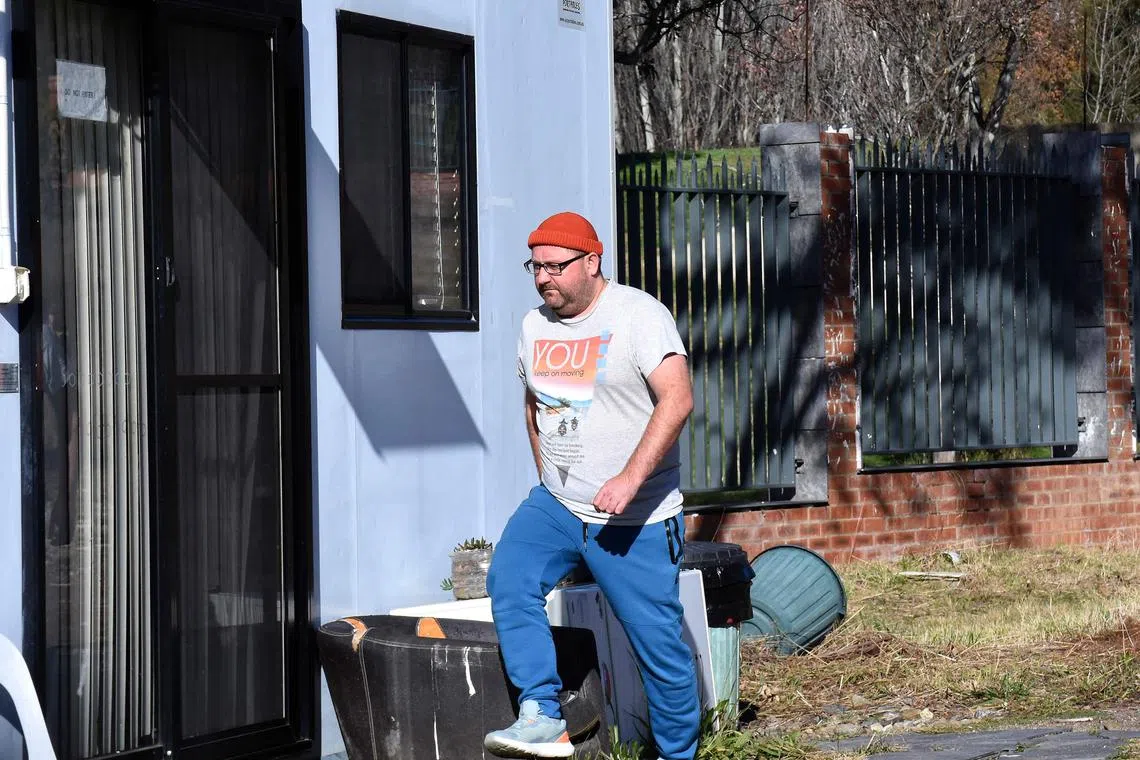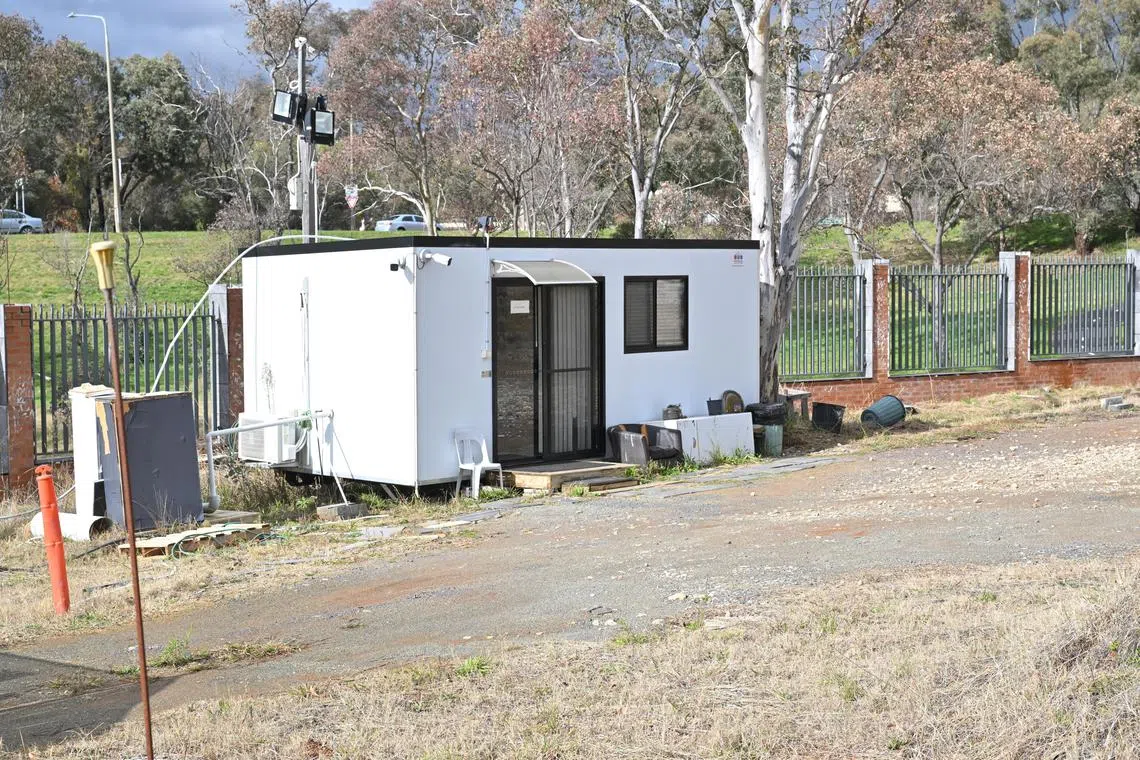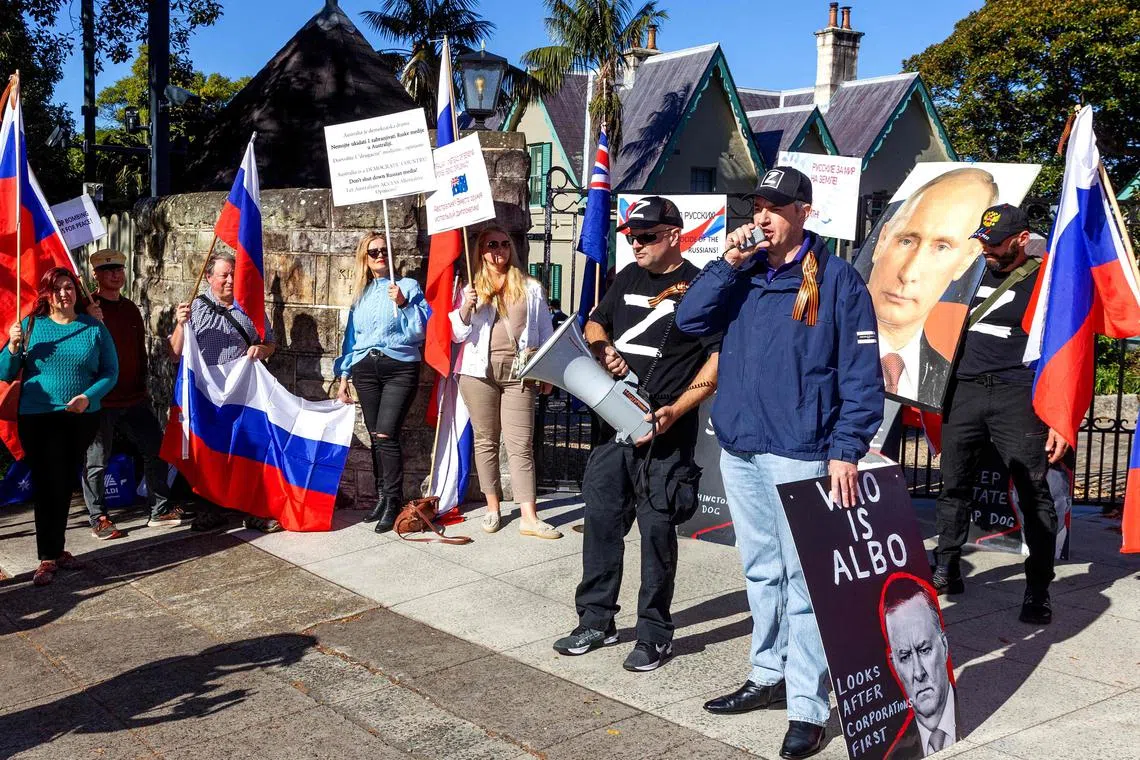Russian diplomat ‘squats’ near Parliament House as Canberra-Moscow ties turn toxic
Sign up now: Get insights on Asia's fast-moving developments

A man believed to be a Russian diplomat at a security shed on a parcel of land in Canberra where Australia has blocked Moscow from building a new embassy.
PHOTO: AFP
Follow topic:
SYDNEY – In 2011, Russia was given approval to build a new embassy on one of the most prized spots in Canberra – a stretch of land near Parliament House.
At the time, the decision by Canberra’s planning authority attracted little attention, especially as it was understandable that Russia wanted to leave its current premises, a modest house on a busy suburban road far from the main diplomatic enclave.
But Russia’s embassy move is now at the heart of a serious – though somewhat farcical – dispute that highlights the extent to which Moscow’s ties with the West and Australia have become toxic.
On June 15, Australia’s Prime Minister Anthony Albanese held a media conference in Canberra to announce plans to cancel Russia’s lease over the prime land,
Mr Albanese did not provide details of the threat, but said his decision was based on concerns about “the construction proposed for this site, the location of this site, and the capability that it would present in terms of potential interference with activity that occurs in this Parliament House”.
The Kremlin, which has not yet finished building its new embassy complex, responded with fury, accusing Australia of “Russophobic hysteria”.
In a strange twist, Russia allegedly sent a diplomat to squat on the property to try to prevent the eviction. The man – believed to be a diplomat – has been living in a shed on the site, but cannot be arrested because of his diplomatic immunity.
Russia has also taken legal action, claiming that the legislation to revoke the lease was unconstitutional.
The saga, which has made global headlines, follows years of growing mistrust between Canberra and Moscow that long predated Russia’s invasion of Ukraine in 2022.
Ties between the two have spiralled since 2014, when Malaysia Airlines Flight MH17 from Amsterdam to Kuala Lumpur was shot down over Ukraine by Russian-backed separatists, killing all 298 people aboard. The flight was carrying 38 Australian citizens and residents, prompting Canberra to join the Netherlands in pushing to hold Russia – and the separatists – responsible.
Memorably, former Australian prime minister Tony Abbott threatened to “shirtfront” – or aggressively confront – Mr Vladimir Putin over MH17 ahead of a visit by the Russian President to Australia for a meeting of leaders of the Group of 20 advanced economies.
But the relationship has only further deteriorated.
Earlier in 2023, it was reported that Russia was behind an elaborate espionage ring uncovered by Australia’s domestic spy agency, the Australian Security Intelligence Organisation (ASIO). According to a report in The Age newspaper, the ring involved Russian spies who posed as diplomats and planned to recruit local informants and use technology to steal data.
In February, ASIO chief Mike Burgess revealed that Australia had deported the spy network.

The Australian newspaper has revealed that a man, believed to be a Russian diplomat, is refusing to leave the land formerly held by Russia for a future embassy, triggering a stand-off with the police.
PHOTO: EPA-EFE
Australia imposed a range of sanctions on Moscow following Russia’s annexation of Crimea in 2014, the downing of MH17 in 2014, and the invasion of Ukraine in 2022.
Two Russian spies were also deported by Australia following an attempt by Russian agents to poison a former Russian spy in the United Kingdom in 2018.
The dispute over the embassy has come amid these tensions, which have been heightened in the past year as Australia took a firm stance against the invasion of Ukraine.
Last Friday, the Russian Foreign Ministry announced a ban on 48 Australian businesspeople, politicians and journalists from visiting Russia, accusing them of a “Russophobic campaign by the collective West”. The ministry said Canberra was “not going to give up its anti-Russia course and continues introducing new sanctions”.
A day later, Australia imposed sanctions and travel bans on three Russians involved in the downing of MH17.
“Australia is steadfast in our commitment to seek truth, justice and accountability for the victims,” said Australia’s Foreign Minister Penny Wong.
Relations between Canberra and Moscow are likely to further decline as long as the Ukraine war continues and Russia denies responsibility for MH17.

Pro-Russia activists demonstrate outside Kirribilli House, an official residence of PM Anthony Albanese, to protest against the Australian government’s decision to block the construction of the new Russian embassy building.
PHOTO: AFP
Meanwhile, the question remains over what to do about the squatter in Canberra.
The opposition has urged the federal government to consider cutting power and water to the site if Russia refuses to vacate it, and ultimately, to declare the man “persona non grata”, meaning that he could be deported.
But Mr Albanese pointed out on Sunday that he did not believe the squatter posed a security threat.
“One bloke standing on a blade of grass shivering in the Canberra frost in the morning is not a threat to our national security,” he told Sky News.
“I’m sure it will be resolved in accordance with the law very swiftly.”


